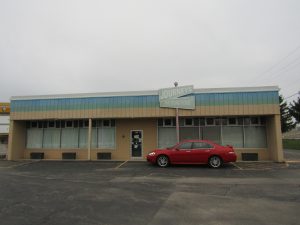Suburban nonprofits struggle amid pandemic and economic crisis
By Igor Studenkov For Chronicle Media — May 11, 2020
The North Chicago Housing Authority will be opening its Section 8 Housing Choice Voucher Wait List at 10 a.m. Friday, May 15. (Photo by Igor Studenkov/for Chronicle Media)
Even in the best of economic times, suburban nonprofits working to reduce homelessness and advocating for affordable housing struggle to get the word out.
Poverty and homelessness are generally seen as a city issues, which reinforces the stigma and keeps the issues under the radar.
But as the COVID-19 pandemic rages on the issue of housing insecurity becomes increasingly acute throughout Chicago suburbs. Open Communities, an affordable housing advocacy organization, has been swamped with calls from renters and homeowners worrying about being able to keep up with their payments. Overnight homeless shelters have closed — and while the organizations that run them were able to place their regular clients at hotels, they are severely limited as to what they can do for people who suddenly find themselves without permanent housing.
While the housing nonprofits have praised volunteers and donors for keeping their work going, they all agreed that they need more donations, and that local, state and federal governments could do more to help. They are calling for the more comprehensive effort to help the homeless and those teetering on the edge, since they are especially vulnerable to getting infected. And they warn that, even when the pandemic subsides, there will be long-term consequences.
Affordable Housing
As previously reported by the Chronicle, affordable housing varies greatly across the region — and it is less likely to be available in the more well-off suburbs. County-level and municipal housing authorities provide rental subsidies through Housing Choice Voucher program, and operate public housing developments for families, seniors and people with disabilities — but that is not even spread across the region. Housing Authority of Cook County has been trying to expand that pool, to some success.
In the wake of COVID-19, housing authorities tried to reduce in-person appointments as much as possible, and that includes appointments for new applicants. Some, such as the Housing Authority of Cook County, are still accepting Housing Choice Voucher applications, but the process must be done entirely though mail and Internet. Others, such as the North Chicago Housing Authority, canceled the appointments as of March 31. The North Chicago Housing Authority, however, will be opening its Section 8 Housing Choice Voucher Wait List at 10 a.m. Friday, May 15. The waitlist will close after 400 applications have been accepted. Applications will be accepted online at: https://northchicagohousing.housingmanager.com/ Applications will be available in different languages.
Evanston-based Open Communities advocates for more affordable housing in the North Shore region, which includes some of Chicago area’s wealthiest ZIP codes.

Palatine-based Journeys The Road Home placed its clients in hotels and continues to support them while observing social distancing. (Photo by Igor Studenkov/for Chronicle Media)
“This has been a problem on the North Shore since the beginning of time — there’s such a lack of affordable housing,” said Mary Ellen Ball, the nonprofit’s CEO. “It’s just so frustrating. North Shore is an area that’s rich in resources — schools, businesses and public transportation, and people who work in restaurants and teach kids in the North Shore can’t live on the North Shore.”
Since the pandemic erupted, the number of calls Open Communities multiplied “by 300 percent.” While, under normal circumstances, Ball said, it may get 5-10 calls for help a week. Now, they are averaging 10 calls a day.
And it’s not just tenants who struggle to pay rent. Ball said they’ve been getting calls from landlords and homeowners struggling to pay their mortgages. Open Communities has been trying to help them all. The big issue, Ball said, is that banks “seem pretty hellbent on keeping business as usual.”
She said that local and state officials can put pressure on banks to “play nice” and accommodate borrowers’ financial difficulties during the pandemic. And she felt that government agencies on local, county and state level could do a better job of getting funding to the nonprofits that need it as quickly as possible.
When asked what kind of donations Open Communities needs, Ball said that, while all donations are appreciated, recurring monthly donations would be most helpful. And, with the number of clients rising, the organization could use the help of attorneys who are licensed in Illinois and have experience with housing issues who would be willing to work pro-bono.
Ball cautioned that, as pandemic subsides, organizations like Open Community will most likely see another surge of renters and property owners looking for help as existing moratoriums on evictions and certain foreclosures expire but people still struggle to rebuild their finances.
“We’re preparing a second wave of crisis that’s probably going to come 3-6 months from now, when people try to get back to work,” she said.
Homeless assistance
In the Chicago suburbs, homeless assistance nonprofits work with local churches and nonprofits to provide overnight Public Action to Deliver Shelter sites. In many cases, they also provide supportive housing facilities where individuals struggling to find stable housing can get a roof over their heads, access to resources and, as the name implies, support.
As the pandemic swept through Chicago area, organizations such as Maywood-based Housing Forward and Palatine-based Journeys the Road Home raced to get their clients from PADS shelters, where social distancing was difficult, to hotels.
Todd Stull, Journeys’ Clinical Director, said that, at the time, they were working with “about 100” people who didn’t have permanent housing.
“We were very fortunate to have a number of private donors and faith communities step up in a huge way at the beginning of this crisis to fund the initial move into the hotels,” he said. “Without the support of our community donors, some of whom have been working with Journeys for decades, we would never have been able to move rapidly to place people into hotel rooms.”
Since then, Stull said, they were able to get additional funding through “a number of government income streams.” This should be enough to keep their clients housed in hotels through the end of May, when the most recent extension of the stay-at-home order is scheduled to expire. But Stull said Journeys is worried about what happens past that.
“We are talking with County, State, and other regional personnel to create a long-term solution,” he said.
Journeys also operates HOPE Day Center to help individuals who are either homelessness or are at risk of becoming homeless by connecting them with health and legal resources, as well as helping them find housing and jobs, and providing mental health support. Stull said the center is still open — though it had to drastically change procedures.
“We went from serving 60 or more people on average per day, inside a space the size of a couple high school classrooms, to flipping to an appointment only space where appropriate physical distancing could keep everyone safe,” he said. “We switched most of our case management to be done over the telephone or computer. Then we created a mobile meal and support service system.”
Stull said that, while Journeys expects to be able to keep it going for a few more months — but he expects it become more challenging as the weather gets colder.
Journeys also continues to work with its sister organization, Pathways Development Institute, to provide supportive housing. Stull said that this approach will go a long way toward helping
“This model is something that needs to be expanded and replicated quickly if we are going to house people safely and help them avoid coronavirus,” he said.
COVID-19 forced organizations like Journeys to close their doors to new clients — even as, Stull said, the pandemic “has drastically impacted everyone who is at risk of losing their housing, or who do not have stable housing.” He explained that Journeys’ priority was on protecting and supporting the clients they already had, but he didn’t rule out “expand[ing] our services outward from our core group of clients” if they can secure more money from federal and private funding sources. And Stull emphasized that governments can do much more to help people who might be in danger of becoming homeless than any organization ever can.
“First, and most importantly, people need to contact their legislators to tell them that there is a desperate need for financial resources to pay rent and mortgages, primarily through unemployment and direct payments,” he said. “Second, we have to fix the lack of testing capacity to quell the current outbreak and future ones, and get people back to work. Third, we need a coordinated regional plan for affordable permanent housing to make sure people can social distance.”







